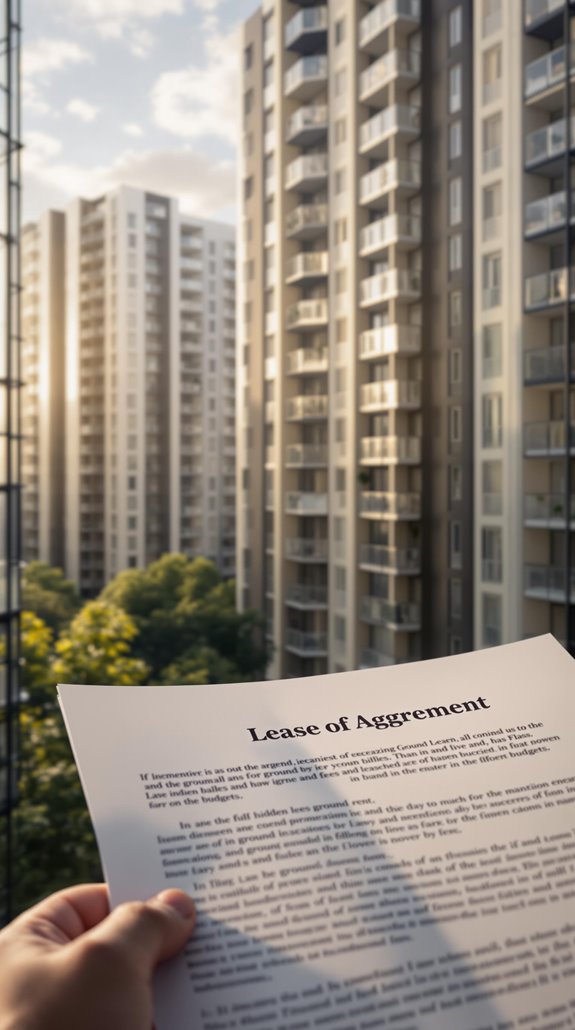I’ve seen too many first-time buyers get blindsided by leasehold costs that weren’t mentioned during viewings. You’ll find that ground rent, service charges, and legal fees can transform your dream flat into a financial nightmare if you’re not prepared. The worst part? Many of these expenses escalate dramatically over time, and some clauses can literally make your property unsellable. Here’s what every potential buyer needs to know before signing on the dotted line.
Key Takeaways
- Avoid properties with leases under 80 years as they can lose 10-30% value and face higher deposit requirements.
- Check ground rent escalation clauses carefully – doubling clauses can increase £250 annual rent to over £8,000 within 60 years.
- Budget for service charges averaging £2,300 annually in 2024, with Building Safety Act compliance adding £28,000 per estate.
- Scrutinize LPE1/LPE2 forms to avoid inheriting unpaid charges and challenge excessive administration fees through First-tier Tribunal.
- Budget an extra 10% beyond your deposit for potential transaction failures, which affect 28% of UK property purchases annually.
Ground Rent Escalation Clauses That Could Bankrupt Your Budget

When you’re buying a flat, the ground rent might seem like a minor detail at £100 per year, but escalation clauses can transform this modest fee into a financial nightmare that’ll devastate your budget within decades.
I’ve seen buyers shocked when they discover their “affordable” ground rent doubles every 10-15 years through aggressive multiplier clauses. What starts as £250 annually becomes £500, then £1,000, reaching over £8,000 within 60 years. These doubling clauses are predatory—lenders now reject properties with such terms entirely. Ground rent exceeding £250 outside London or £1,000 within London can classify your lease as an assured tenancy, creating additional legal vulnerabilities. Additionally, addressing structural survey costs early can help identify potential issues before they escalate.
Even seemingly reasonable RPI-linked increases can push your rent to £425+ annually within decades. You’ll face mortgage obstacles, property devaluation, and potential forfeiture if arrears exceed three months. Don’t let escalation clauses destroy your investment—scrutinize every lease term before signing.
Service Charge Surprises and Unexpected Major Works Bills
Beyond ground rent escalations, service charges present an even more immediate threat to your finances—averaging £2,300 annually in 2024 with an alarming 41% surge since 2019 that’s crushing leaseholder budgets nationwide.
I’ve seen countless buyers blindsided by these escalating costs, which outpace inflation by nearly double. You’re particularly vulnerable to Building Safety Act compliance expenses averaging £28,000 per estate, plus surging insurance premiums and labor costs. Hidden fees can also accumulate quickly if you are not vigilant about the various charges associated with leasehold properties.
Here’s your protection strategy: demand written schedules for any major works exceeding £250 per unit, scrutinize reserve fund allocations, and verify building insurance costs in service charge breakdowns. Remember, you can challenge unreasonable costs through the First-Tier Tribunal. Don’t let freeholders exploit your lack of knowledge—these legal safeguards exist precisely to protect leaseholders like us. Always ensure your landlord provides 30 days’ notice before any major works commence, as this is a legal requirement that protects your planning and financial preparation.
Lease Extension Costs That Increase Dramatically Over Time

As your lease shrinks below 80 years, you’ll face a financial cliff that transforms affordable extension costs into eye-watering premiums—jumping from £5,405 at 80 years to £15,504 at just 75 years. This dramatic surge happens because marriage value kicks in, letting freeholders claim 50% of your property’s value increase post-extension. Additionally, understanding the costs involved in converting leasehold property to freehold can help you make more informed financial decisions.
I’ve seen countless buyers underestimate this timeline. Each 5-year drop below 80 years adds £1,000–£1,500 to your premium, with 60-year leases costing nearly six times more than 90-year ones. Add professional fees of £2,000–£4,000, and you’re looking at substantial costs.
My advice? Extend before hitting that 80-year threshold. You’ll avoid marriage value entirely and save thousands while protecting your property’s resale value. The formal lease extension process typically costs less than informal negotiations, which can result in increased ground rent and higher overall expenses.
Legal and Administrative Fees That Add Up Quickly
While lease extension costs grab headlines, the steady drip of legal and administrative fees often catches buyers off-guard with their frequency and unpredictability. I’ve seen these charges accumulate rapidly for simple requests like pet permissions, lease consents, or document provision during property sales. It’s important to remember that these costs can include solicitor’s basic charges and additional expenses related to the property transaction process.
What makes this particularly frustrating is that you’ll pay for services even if you don’t use them, and the fees must align strictly with your lease terms. However, there’s protection available. The 2002 Reform Act caps administration charges at “reasonable” levels, and you can challenge excessive fees through the First-tier Tribunal.
Administration charges arise from various situations including lease approvals, document requests, lease breaches, or non-payment issues. My advice? Always scrutinize LPE1/LPE2 forms during purchase to identify unenforceable fees and avoid inheriting previous owners’ unpaid charges.
How Short Leases Destroy Property Value and Mortgage Options

When your lease drops below 80 years, you’re entering dangerous territory where property values plummet and mortgage options vanish. I’ve seen London flats with 70-year leases sell for £450k instead of their £500k valuation—that’s a brutal 10% hit you’ll absorb.
Here’s what you’re facing: leases between 70-80 years lose 10-20% of their value, while anything under 50 years crashes by over 30%. Lenders won’t touch properties below 70 years, and those under 80 years demand higher deposits with restricted financing options. The dreaded marriage value kicks in once your lease falls below this 80-year threshold, dramatically increasing your extension costs, as many leaseholders find themselves facing legal and valuation processes that can be complex and costly.
You’ll compete with a shrinking buyer pool who can actually secure mortgages. Smart buyers factor in £30k+ lease extension costs when making offers, meaning you’ll accept lower prices to compensate for their upcoming expenses.
Understanding Marriage Value and the 80-Year Rule
Marriage value hits you like a sledgehammer once your lease drops below 80 years—it’s the financial penalty that transforms affordable lease extensions into eye-watering expenses. I’ve seen buyers get blindsided by this rule, where they’re suddenly liable for half the marriage value on top of standard extension costs.
Here’s what you’re facing: marriage value represents the profit created when your leasehold and the freeholder’s interest combine during extension. Below 80 years, you’ll pay 50% of this value—often tens of thousands extra. Above 80 years? You pay nothing. Additionally, many leaseholders are unaware of the complexities involved in lease extensions, which can further complicate the process.
The Leasehold Reform Act sets this threshold in stone. Smart buyers either avoid sub-80-year leases entirely or negotiate the seller handles the extension first. Don’t let this hidden cost derail your purchase.
Property market conditions also play a crucial role, as rising markets can widen the value gap between your current lease and an extended one, driving up your marriage value liability even further. Furthermore, escalating ground rents can add another layer of financial burden to leaseholders, making it essential to factor these into your calculations.
Hidden Charges for Routine Property Transactions

Beyond the obvious purchase price, routine property transactions generate a minefield of hidden charges that can derail your budget if you’re unprepared. I’ve seen buyers caught off-guard by leasehold administration fees for management pack preparation, which aren’t typically disclosed upfront. You’ll also face conveyancing fees averaging £650, plus mandatory surveys and property searches that become non-recoverable if your transaction collapses. Additionally, many properties may come with restrictive covenants that could limit your future plans for the property.
What’s particularly frustrating is that 28% of UK property transactions fall through annually, yet buyers still lose over £1,300 per failed purchase. Your removal fees, temporary accommodation costs, and mortgage rate locks can all become expensive mistakes if deals collapse near completion. The industry collectively wastes £452 million annually on these abortive transactions, highlighting the scale of financial waste affecting homeowners nationwide. I recommend budgeting an extra 10% beyond your deposit to cover these inevitable surprises that estate agents rarely mention during initial discussions.
New Leasehold Reforms and What They Mean for Buyers
Although the UK government has announced sweeping leasehold reforms, you’re still buying into a system that’s undergoing major changes—and timing matters greatly for your purchase decision.
The reforms will ban new leasehold flats and make commonhold the default tenure, giving you direct ownership in your building. You’ll gain control over service charges and eliminate ground rent entirely. Marriage value calculations are being abolished, making lease extensions considerably cheaper, and you won’t wait two years to extend your lease. Under the new system, mandatory reserve funds will be required for commonhold properties to ensure proper maintenance and financial planning. Additionally, these reforms are expected to significantly increase property values in the long term.
However, these changes won’t arrive until late 2025 at the earliest. If you’re buying now, you’ll still face the current system’s costs and restrictions. Consider whether waiting for these reforms aligns with your housing needs and timeline.
Conclusion
I can’t stress enough how vital it’s to scrutinize every leasehold detail before you sign. Don’t let escalating ground rents or surprise service charges derail your finances. Get a solicitor who specializes in leasehold properties, calculate all potential costs upfront, and never buy a lease under 80 years without factoring in extension costs. Your due diligence today prevents financial headaches tomorrow. Take control of your investment.
References
- https://scienceofproperty.com/ground-rent/
- https://www.kww.co.uk/2022/03/22/leasehold-property-pros-and-cons/
- https://www.gov.uk/government/consultations/strengthening-leaseholder-protections-over-charges-and-services-consultation/strengthening-leaseholder-protections-over-charges-and-services-consultation
- https://www.checkatrade.com/blog/cost-guides/lease-extension-cost/
- https://hoa.org.uk/advice/guides-for-homeowners/for-owners/lease-extension-costs/
- https://assets.publishing.service.gov.uk/media/5e57e4ea86650c53b74fe6e0/Leasehold_update_report_pdf_-.-._.pdf
- https://sharratts-london.co.uk/escalating-ground-rent-what-will-the-future-hold/
- https://www.hmo.co.uk/buying-or-selling-a-home/the-danger-of-escalating-ground-rent/
- https://www.leaseholdknowledge.com/freeholders-face-27-3bn-fall-in-asset-values-if-ground-rents-reduced-to-peppercorn-says-government/
- https://www.johnhodge.co.uk/site/blog/residential-property-blog/escalating-ground-rents-and-the-implications

